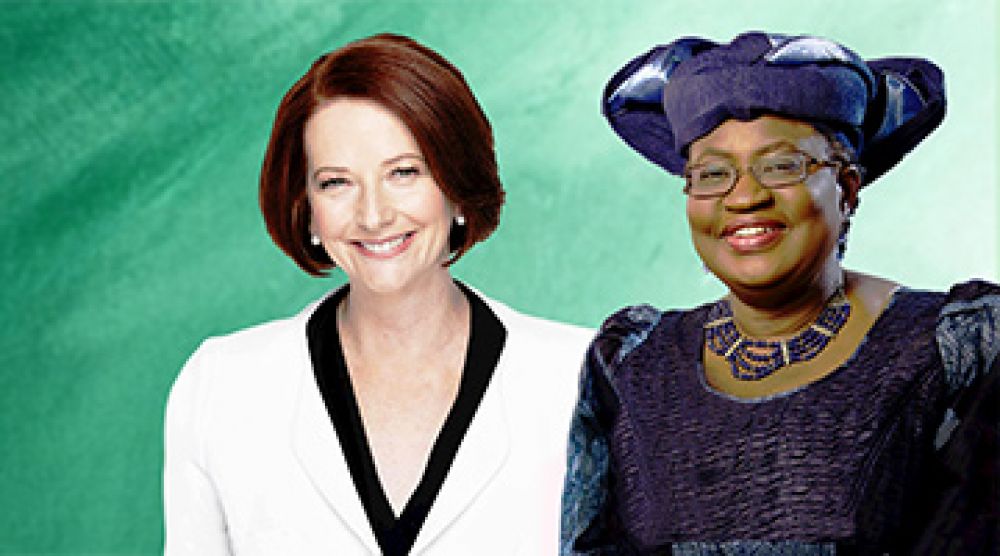- Title: Women and Leadership: Real Lives, Real Lessons
- Authors: Ngozi Okonjo-Iweala and Julia Gillard
Pages: 325 - Publisher: Penguin Random House UK
- Reviewer: Nathaniel Bivan
“Going by the names of interviewees on the cover, I would love to read it,” is likely to be some readers’ first reaction to this book. Authored by Nigeria’s Ngozi Okonjo-Iweala and Australia’s Julia Gillard, it is filled with stories from another eight of some of the world’s most influential women.
An economist, Okonjo-Iweala needs no introduction as she’s currently a candidate for one of the world’s top jobs, as Director-General of the World Trade Organisation. She served twice as Nigeria’s Finance Minister, and briefly as Foreign Minister, the first woman to hold both positions. An important aspect of this book is its story of firsts for women in leadership, and Gillard is another example.
Gillard was the first woman to serve as prime minister of Australia. She received worldwide attention for her October 2012 speech in Parliament on the treatment of women in professional and public life. Unlike Okonjo-Iweala who is Chair of GAVI, the Vaccine Alliance which improves access to new and underused vaccines for children living in the world’s poorest countries, the former is Chair of the Global Institute for Women’s Leadership at King’s College, London, and no wonder she says she has always been a feminist “for as long as I can remember” while Okojo-Iweala opts for a more subtle description, womanist, a word she wrote was invented by the writer Alice Walker. In April 2021 she’s set to become Chair of the Wellcome Institute.
A vital angle to this work is the writers’ effort to show how the eight women they interviewed either sought leadership decisively from a young age, were drawn to it by circumstance or by accident. Take for instance the case of Joyce Banda. She married early, at age twenty-one, and by twenty-five had three children. After the end of her marriage in 1981, she had to find a way to live as a single mother. So, she went back to work and started a small business alongside. Two years later she married Richard Banda, who was a lawyer and judge. They had two children and her husband helped her grow her business “so that, by 1990, she was one of the richest women in Malawi.
However, what propelled Mrs. Banda to leadership was not running a business but her past marriage experience. She made it a mission to help women “escape from abuse at the hands of their partners” by establishing the National Association of Business Women in Malawi in 1989. By 1997 the organisation had mobilised fifty thousand women, with twenty thousand receiving microfinance support. Long story short, Joyce went on to become the president of Malawi after a rocky journey.
A contrary example takes us to the experience of Erna Solberg who had supportive parents and is presently Prime Minister of Norway. She says: “From my mum and dad, I just felt as if I could do anything. It was never about gender.” Theresa May, Prime Minister of the United Kingdom from 2016 to 2019, also had a similar upbringing. “From about the age of twelve or thirteen, I was interested in becoming a member of parliament. The political bug just caught me at that point,” she says.
In as much as some men may find it difficult to identify with the contents of this book, there’s no trivialising its value in the hands of anyone interested in managing leadership roles, especially that which requires carrying the burden of an entire nation. One thing ‘Women and Leadership’ also examines that is worthy of note are the challenges some of these eight women faced in their rise to power (and in some instances, how they overcame them). Some, like Solberg, are still battling the storms while others like May, had to face up to trying times that didn’t quite end well.
May became UK’s Prime Minister “in a glass cliff moment.” She got the job “in the aftermath of a huge shock and inherited a sharply divided political party and nation, as well as the diabolically complex task of carrying out Brexit, as Britain’s exit from the European Union came to be known.” Unfortunately, circumstances made her resign on 24 July 2019.
There are remarkable accounts of those featured in this book, like Ellen Johnson Sirleaf, who served as Liberia’s 24th president from 2006 to 2018, New Zealand’s Prime Minister Jacinda Ardern, Chile’s first female president, Michelle Bachelet (from 2006 to 2010), Hillary Clinton who was United State’s 67th secretary of state, and Christine Lagarde, President of the European Central Bank since 2019. But this book is beyond these women’s stories. It’s about advancing the drive of women toward equality in leadership and opportunities in the work place. Although their stories compliment this motive, what’s arguably most thrilling and commendable about Okonjo-Iweala and Gillard’s work here is the objectivity with which the accounts are told and the strength of their interviewees in the face of dare-devil challenges.

 Join Daily Trust WhatsApp Community For Quick Access To News and Happenings Around You.
Join Daily Trust WhatsApp Community For Quick Access To News and Happenings Around You.


